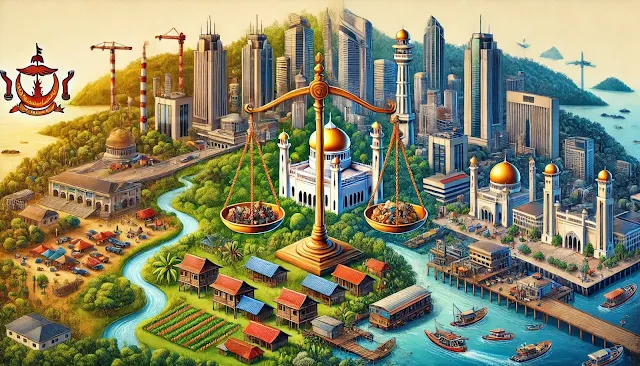By Malai Hassan Othman
In the heart of Southeast Asia, Brunei stands as a symbol of wealth and cultural heritage. However, recent talks among citizens highlight a range of concerns that reflect the current state of the nation's economy and policies.
These concerns, which include restrictive foreign policies and economic stagnation, contribute to a sense of uncertainty about the future.
Economic Stagnation: A Call for Progress
Brunei's economic stagnation is a significant issue for its citizens.
The country faces challenges such as ageing infrastructure, limited interbank and international banking facilities, and a stagnant population.
There is a perception that the lack of foreign investment, attributed to a perceived lack of local talent, exacerbates these issues.
Recent data indicates that Brunei's GDP expanded by 1.4% in 2023, recovering from two consecutive years of contraction.
However, the oil and gas sector, a major contributor to the economy, contracted by 2.0% due to persistent disruptions in production.
On the other hand, the non-oil and gas sector, which includes finance, air transport, and communication services, has shown growth and now contributes 53% to the economy.
The strength of Brunei's currency pegged to the Singapore Dollar, is another topic of discussion.
While the currency's strength signals stability, some believe it does not fully reflect the underlying economic reality.
This perceived disconnect between the currency's strength and the country's economic health can be frustrating as it impacts exports and inflates the cost of living.
The Role of Foreign Workers: Balancing Perspectives
Foreign business owners and workers, particularly from Bangladesh, are often regarded as resilient and adaptable—traits some feel are lacking among locals.
There have been discussions about qualities perceived to be lacking among locals.
Discussions have arisen around the recent challenges in foreign labour quotas and the departure of successful foreign business owners, which have left gaps that local entrepreneurs struggle to fill.
Consequently, there is a shortage of skilled workers and businesses capable of meeting the country's needs.
While some sentiment suggests that Bruneians, despite having access to government support, may not fully capitalise on business opportunities due to a lack of innovation and risk-taking, it is important to consider the broader context.
Decades of protective policies and reliance on government assistance may have contributed to a more risk-averse mindset.
Calls for Economic Reform: Stimulus or Structural Change?
There are ongoing discussions about the need for economic reform in Brunei.
Proposals for an Economic Stimulus Package (ESP) aim to boost domestic spending and stimulate the economy.
However, some argue that such measures address only the symptoms rather than the root causes of economic challenges.
They believe that once the stimulus ends, underlying structural issues will persist, and the country will face similar problems again.
Comparisons with Singapore's successful economic policies highlight different approaches.
While Singapore has managed to implement multiple effective stimulus packages, Brunei's economic fundamentals are seen as needing more strength to sustain similar measures.
This has led to calls for comprehensive economic reforms that address structural deficiencies and create a more conducive environment for business and investment.
Positive Developments and Future Outlook
Despite the challenges, there are notable efforts and positive developments in Brunei.
The non-oil and gas sector's growth, which now contributes 53% to the economy, highlights ongoing diversification efforts.
The Pulau Muara Besar (PMB) Phase 2 Development Project with Hengyi Industries is a significant infrastructure investment expected to create job opportunities for 2,000 workers by 2029.
Additionally, Brunei has made strides in improving its ease of doing business, ranking second globally in regulatory matters with an impressive score of 8.8 out of 10.
The government is also focusing on education and training initiatives to enhance the skills of the local workforce, ensuring they remain relevant in a rapidly changing economy.
Efforts to expand digital infrastructure and improve connectivity are underway, contributing to the growth of the finance and communication sectors.
Looking forward, Brunei's GDP is forecasted to grow by 2.7% in 2024, driven by a resurgence in the oil and gas sector and continued expansion of the non-oil and gas sector.
Inflation is expected to remain low at 0.8%, supported by stable global trade and effective government policies.
A Nation at a Crossroads
Brunei is at a crossroads, with its citizens voicing concerns and hopes for the future.
The current policies and economic conditions are seen as a call to action for progressive and dynamic governance and economic management.
The call for reform and adaptation is louder than ever, and whether the government will undertake the necessary changes remains to be seen.
As Brunei navigates these challenges, the voices of its citizens serve as a reminder that complacency is not an option.
The nation's future depends on its ability to adapt, innovate, and embrace change.
Only time will tell if Brunei can rise to the occasion and secure a prosperous future for its people. (MHO/08/2024)


.jpeg)








